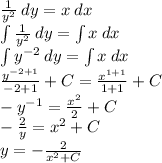You can solve this differential equation by separating the variables and differentiating both sides.
1) Multiply both sides by dx and divide both sides by

.

2) Integrate both sides. Remember the
power rule for integrals. Say you have a value

, where

. Take the power, n, and add 1. Then divide the new expression

by the new power, n + 1. The integral of

would be

(+C, if it is an indefinite integral). Remember that you can subtract C from both sides and just have C on one side (since the constant doesn't have a definite value):
 Your solution is
Your solution is
 .
.